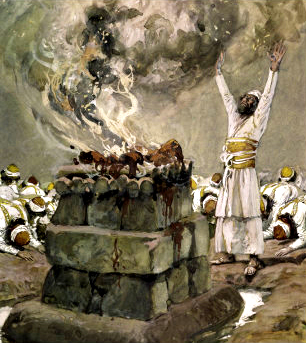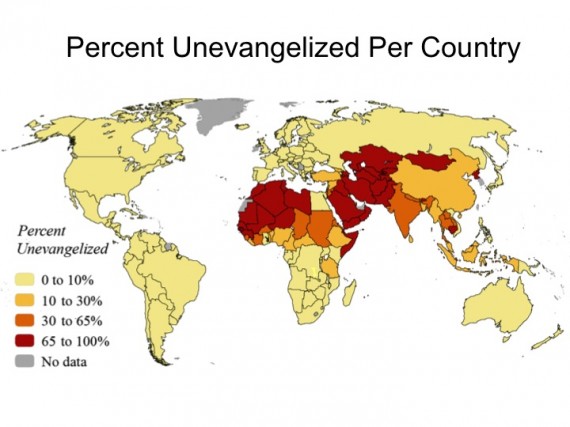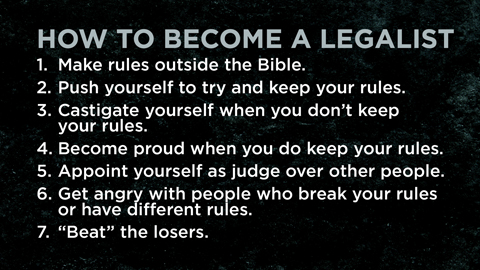The last couple weeks I have been working my way through dozens of Bible and theology questions which people have submitted through that “ask a question” area in the sidebar. This one deals with the age-old question of “What about those who have never heard?” Here is the question that was sent in:
If salvation was via sacrifices etc (Jews) and then via believing in Jesus; what happens to those outside these two faiths?
There is a hidden question within this question. The obvious question is the age-old dilemma, “What about those who have never heard the Gospel?”

But the question behind the question is “How did people receive eternal life before Jesus?” The assumption is always that the Jewish people received eternal life through obedience to the Law and following the sacrificial system instituted by Moses.
I don’t believe that anyone ever received eternal life through following the Mosaic Law or through the Levitical sacrificial system. Though many people think the Bible teaches this, it doesn’t.
If we can understand how Jewish people were saved prior to the death and resurrection of Jesus, then we can begin to answer how other people around the world may be able to receive eternal life before they have heard about Jesus.
So how did people receive eternal life before Jesus came to earth? The same way we do: by faith alone.
The Mosaic Law Never Granted Eternal Life to Anyone
A careful reading of the Mosaic Law reveals that there was no such thing as a sacrifice for willful sin. Does this mean then that people back then never sinned willfully? Of course not! They sinned willfully just as much as we do. We often know that what we are doing is wrong, but we do it anyway. It was the same for them.
Since there was no sacrifice in the Mosaic Law for willful sin, what could they do when they sinned willfully? The same thing we do! We depend on God for His grace, love, and forgiveness.
The Mosaic Law and the sacrificial system did not grant anybody eternal life.
People who lived before Jesus received eternal life the same way we do: by faith alone.
One purpose of the Levitical Law was to maintain community standards of health, safety, and well-being before God and before one another. As a theocracy, the Levitical laws functioned much like the laws in a democracy. Today, we have have national and local laws to help maintain order, peace, and security. But nobody thinks that by obeying the speed limit and paying your taxes you get to go to heaven.
 It was the same for the Israelites. The Mosaic Law was to maintain peace, order, security, and safety. Because Israel was intended to be a theocracy, there were also numerous laws related to the worship of God, but again, these were not intended to grant a person eternal life, but simply to maintain fellowship with other members of the Israelite community.
It was the same for the Israelites. The Mosaic Law was to maintain peace, order, security, and safety. Because Israel was intended to be a theocracy, there were also numerous laws related to the worship of God, but again, these were not intended to grant a person eternal life, but simply to maintain fellowship with other members of the Israelite community.
There were other purposes for the law as well, but I won’t get sidetracked with that issue here. (A new book is coming out by Maxine Armstrong soon which helps shed light on the purpose of the Law… ).
How Jewish People before Jesus Received Eternal Life
Once we understand the purpose and function of the Mosaic law for Israel, we can begin to understand how people receive eternal life, even if they have not heard about Jesus. While I firmly believe the truth of Acts 4:12 that there is no other name under heaven by which we must be saved, I have to argue that at least prior to the ministry of Jesus, people could have received eternal life by believing in God’s promises to rescue and deliver them, even if they didn’t know the name “Jesus.”
In other words, prior to the advent, ministry, death, and resurrection of Jesus, God gave eternal life to people who believed in Him for it. This does not mean that they simply believed that He existed any more than “believing in Jesus” means nothing more than that Jesus existed.
No, to believe in God means to believe that purely by His grace and out of His love, He gives eternal life freely to anyone and everyone who believes in Him for it.
That, I believe, is how Jewish people received eternal life in Old Testament times.
By faith, the Israelites placed themselves in the hands of God to do with as He wished. They did not know the name of Jesus, but they knew some things about God, and they believed what God had said. They believed the revelation that God had given.
But what about non-Jewish people who lived before Jesus?
So if God gave eternal life to the Jewish person who simply believed in Him based on the revelation He had been given, I think it is likely that something similar took place all around the world. I am not saying that if people simply believe what they learn about God from nature that this will be enough for God to grant them eternal life.
I do not think that natural revelation is enough revelation to bring anyone to eternal life.
However, if a person responds positively to the revelation which God has placed in creation and in the human conscience, I believe that God will make sure that this person receives more revelation.
Romans 1 and other biblical texts state that God has revealed certain truths about Himself in nature so that men are without excuse. I think that as people respond to the revelation they have received, God obligates Himself to provide more revelation to them, so that they receive enough revelation from God to either accept the offer of eternal life by faith alone, or to reject such an offer.
This then helps us understand what may be going on to people today who have never heard about Jesus.
What About Those Who Never Hear the Gospel?
So what about those who have never heard? Again, I believe that if they respond to the revelation they have received, God has obligated Himself to make sure they receive more revelation, until they get to the point where they have enough revelation to receive eternal life.
 Note that this level of revelation might be different for different people of different ages and of different mental capacities.
Note that this level of revelation might be different for different people of different ages and of different mental capacities.
Note as well that my proposal here says nothing about children who die before they are old enough to understand the Gospel, nor does it say anything about people who are mentally handicapped who can never understand much of anything about the Gospel. Those are related, but different, questions.
How does God make such revelation available to others?
There are a variety of ways in which God can provide further revelation to those who respond to the revelation they have. Some of these forms of revelation are even mentioned in Scripture.
If a missionary is available, God could send a missionary. If a missionary is not available, God could send angels to teach these people, or through the Holy Spirit moving like wind upon the earth, God could simply whisper more revelation to those who are responding to the truth they have received. Then, of course, there are dreams and visions. We often hear reports even today of people who have dreams and visions about Jesus who may have never heard of Him before.
Bottom Line on Those Who Have Never Heard
I fully admit that some of what I have written above is speculative. The Bible is relatively silent about the eternal destiny of those who have never heard. While some people say that all those who have never heard receive eternal life (universalism), I cannot accept this idea.
Others teach a form of Christian reincarnation so that before a person’s eternal life is finally determined, they get to live a life in which they have the opportunity to hear and respond to the Gospel. I reject that view as well.
Then there are some who say that God, in His infinite foreknowledge, looks into the possible futures of a person’s life to see what that person would have done if they had heard the Gospel. This view sounds a bit like that Tom Cruise movie “Minority Report” where people are condemned for crimes they haven’t yet committed.
Some say that God gives people who die without hearing the Gospel an opportunity after death to hear and believe it. This has a bit of merit from Scripture (depending on how you understand Abraham’s bosom in Luke 16:19-31, and the statement in 1 Peter 3:19 about how Jesus preached to the spirits in prison), but again, this view is highly speculative.
The bottom line is this: We don’t know for sure exactly what happens to those who have never heard the Gospel.
But we do know that God is loving, kind, merciful, gracious, and resourceful.
Based on what I know of God, I don’t think it is within the character or nature of God to separate anyone from Him eternally simply because they were unlucky enough to live in an area that didn’t have a Bible. The Bible serves God’s purposes; God does not serve the Bible. God’s work in the world is not limited only to where the Bible is available.
Ultimately and finally, we can do nothing more than depend on the grace of God, that He will do what is right.
What do you think? Weigh in below with your own perspective on what happens to people who have never heard the Gospel.




 So it was with interest that I recently read the new book by Boyd Seevers,
So it was with interest that I recently read the new book by Boyd Seevers, 





 I am teaching my daughters math, and while I know Calculus, I cannot attempt to teach them everything I know about math on day one, from basic arithmetic all the way to calculus. Not only is there not enough time to do this, they would not comprehend most of it, but would instead get overwhelmed and as a result, would not even understand the most basic concepts in math.
I am teaching my daughters math, and while I know Calculus, I cannot attempt to teach them everything I know about math on day one, from basic arithmetic all the way to calculus. Not only is there not enough time to do this, they would not comprehend most of it, but would instead get overwhelmed and as a result, would not even understand the most basic concepts in math.

 How do you think victory comes, except through ever-increasing cycles of temptation? Sure, God does not send the temptations, and He never allows us to be tempted with more than we can bear, but if we pray for God to give us victory over sin and temptation, this is the same thing as asking God to strengthen us so that we can stand up under greater and greater temptations!
How do you think victory comes, except through ever-increasing cycles of temptation? Sure, God does not send the temptations, and He never allows us to be tempted with more than we can bear, but if we pray for God to give us victory over sin and temptation, this is the same thing as asking God to strengthen us so that we can stand up under greater and greater temptations!






 It’s doesn’t look like sin! But at it’s core, legalism fosters pride, arrogance, judgmentalism, and self-righteousness.
It’s doesn’t look like sin! But at it’s core, legalism fosters pride, arrogance, judgmentalism, and self-righteousness. Yes, Jesus said that “Unless your righteousness exceeds that of the Scribes and Pharisees, you will never enter the Kingdom of heaven” (Matthew 5:20). But Jesus was not calling His followers to become more righteous than the scribes and Pharisees. He was saying that when it comes to personal righteousness, you have to be more perfect than the scribes and pharisees, which is impossible! Therefore, don’t even try! Fall upon the grace, mercy, and love of God instead.
Yes, Jesus said that “Unless your righteousness exceeds that of the Scribes and Pharisees, you will never enter the Kingdom of heaven” (Matthew 5:20). But Jesus was not calling His followers to become more righteous than the scribes and Pharisees. He was saying that when it comes to personal righteousness, you have to be more perfect than the scribes and pharisees, which is impossible! Therefore, don’t even try! Fall upon the grace, mercy, and love of God instead.

 The first is Romans 1:2, but there the word Paul uses for “holy” is hagiais instead of the normal word for divine holiness, hierais. The same usage applies to Romans 7:12 where Paul speaks of the “holy law.”
The first is Romans 1:2, but there the word Paul uses for “holy” is hagiais instead of the normal word for divine holiness, hierais. The same usage applies to Romans 7:12 where Paul speaks of the “holy law.” 

